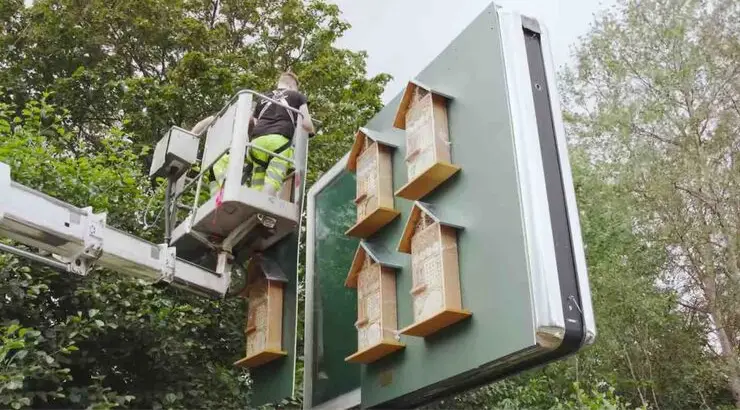Animals
McDonald’s is Turning Dozens of Its Billboards Into ‘Bee Hotels’
Critics, however, regularly accuse the mega-corporation of manipulating consumer sentiment.

(TMU) — Fast-food restaurant chain McDonald’s has long been known as one of the world’s biggest polluters and garbage producers, whether it be in the form of junk food and pesticides or the excessive plastic packaging and throwaway “Happy Meal” toys it relentlessly pumps out across the globe.
However, the global chain is hoping it can put its marketing to good use by turning its outdoor ads in Sweden into “bee hotels” that can help boost the essential pollinator population.
The Swedish branch of the company has joined forces with advertising corporation JCDecaux in a bid to turn its billboards into structures that double as bee shelters. To that end, the company is drilling holes into dozens of its outdoor ads to attract and house honeybees.
The company has also teamed up with creative agency NORD DDB to build elaborate billboard “homes” for bees that resemble the restaurant, Branding.news reports.
McDonald’s is hoping that it can convey to consumers that rather than being a big part of the problem, the Golden Arches ca be a part of the solution.
Henrik Nerell, Environmental Manager at McDonald’s in Sweden, explained:
“The survival of bees is an important issue for society as a whole. That we can use our signs for a good cause feels great. The initiative, which has sprung from our franchisees’ personal commitment to the issue, has been made possible in collaboration with JC Decaux and we are proud and excited to welcome our flying guests soon as they move into our bee hotels.”
Scientists across the world have been sounding the alarm in recent years over Colony Collapse Disorder—a fast-unfolding problem that many fear could become an existential crisis for bee populations around the globe. Studies have largely blamed the overuse of toxic pesticides for the crisis, along with climate change, habitat loss, and disease.
https://twitter.com/KlatuBaradaNiko/status/1176736616640942081
However, experts have warned that our healthy urge to help prop up the bee population won’t be solved by purchasing or building ticky-tack “bee houses.” In fact, rather than becoming an ideal home for the pollinators, bee houses can quickly become wretched hives of parasites and pollution—essentially dooming the poor bees seeking shelter in miniature “roach motels.”
As Gizmodo reports:
“The most prevalent problem with bee houses is that when they’re not cared for properly, they can become breeding grounds for pests, mold, fungus, and disease. As Colin Purrington, an evolutionary biologist and bee house enthusiast who recently had a viral thread on Twitter about deadly bee houses, put it to Earther, it’s like having a hotel with no maid service. ‘If you were staying in a hotel and it never, ever cleaned anything it would be gross,’ he said.”
Critics regularly accuse the fast-food mega-corporation of “greenwashing,” or manipulating consumer sentiment by depicting itself as somehow being more sustainable and ethical than it actually is.
In the past, the company has pledged to recycle more; source cage-free eggs; use “sustainably sourced” beef and coffee beans; and commit to a range of climate initiatives to reduce the company’s massive contribution to greenhouse gas emissions. Yet critics have lambasted the conglomerate for simply adding a bit of environmentalist spin to its propaganda portfolio in a bid to remain attractive to an increasingly environmentally conscious customer base.
Whether the company’s new “bee house” ad strategy is more of the same remains to be seen. :
But to quote a snarky Burger King guerilla marketing campaign:
“The moral is: never trust a clown.”
https://twitter.com/StephenKing___/status/1007653969735405568
By Elias Marat | Creative Commons | TheMindUnleashed.com
Typos, corrections and/or news tips? Email us at Contact@TheMindUnleashed.com
